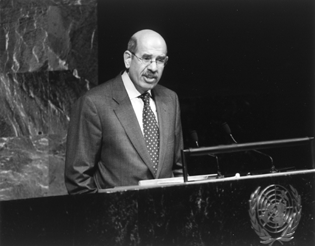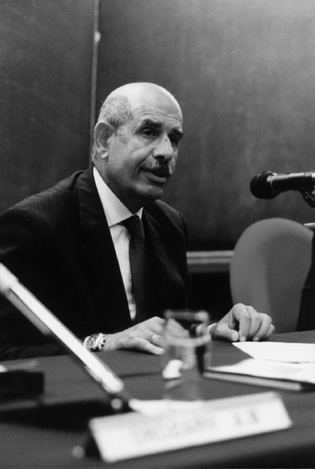Personal tools
News from ICTP 92 - Features - M ElBaradei

Mohamed ElBaradei, Director General of the International Atomic Energy Agency (IAEA), recently sat down with the editor of News from ICTP for a wide-ranging discussion focusing on the overall challenges confronting IAEA.
Conversation with
Mohamed ElBaradei
Egyptian-born Mohamed ElBaradei earned his initial law degree in the 1960s at the University of Cairo, and his master's degree and doctorate in international law at New York University in 1974. He began his diplomatic career in the Egyptian Ministry of Foreign Affairs in 1964, serving in the Permanent Missions of Egypt to the United Nations in New York and Geneva. He has been a senior member of IAEA Secretariat since 1984, holding several high-level policy positions, including representative of the Director General of IAEA to the United Nations in New York, the Agency's Legal Adviser and Director of the Legal Division. He was subsequently appointed Head of the Division of External Relations and Assistant Director General for External Relations. ElBaradei became Director General of IAEA on 1 December 1997.
What are the critical challenges that IAEA faces today?
IAEA's mandate is to focus on nuclear technology and to ensure
that it is used safely and exclusively for peaceful purposes.
Nuclear power is at a standstill in many parts of the world, particularly
in the North. Many forces are driving this trend, including questions
of safety, waste management, economic competitiveness and, perhaps
most significantly, public confidence. People throughout the world
remain fearful of another severe accident like the one that took
place at Chernobyl. On the other hand, the public has become increasingly
concerned about the potential impacts of global climate change.
Nuclear power is one of the few energy sources that can generate
large amounts of 'clean' electricity--clean in terms of greenhouse
gas emissions. From IAEA's point of view, only two options--fossil
fuel and nuclear power--are available to meet the expected explosive
growth in demand for electricity over the next few decades. If,
as many experts agree, climate change poses a threat to the environment,
then increased use of fossil fuels carries distinct liabilities.
However, for nuclear power to remain an option, the public must
be convinced that it's safe and investors must be convinced that
it's economically competitive with other energy sources. That's
why IAEA must work with member states to extend the culture of
nuclear safety throughout the world, restore nuclear power's economic
viability, and rebuild public confidence by helping to educate
people about nuclear energy's risks and benefits. Another challenge
facing IAEA is to ensure that technical knowledge about nuclear
energy continues to be made available. Here the discussion moves
beyond electricity to such equally vital areas as health, agriculture
and hydrology. Take, for example, efforts to locate precious ground
water supplies, an issue of vital importance to the developing
world. The use of nuclear isotopes offers a much more efficient
method for finding ground water reserves. Nuclear technology may
also play a role in the detection of abandoned land mines, helping
to rid the world of these terrible devices that cripple and kill
so many innocent people. IAEA's technical co-operation programme
is our main vehicle for transferring nuclear applications to developing
countries. Because our budget is limited, we must be sure that
our efforts fit within a nation's larger development strategies
and we must work closely with others seeking the same goals.

Mohamed ElBaradei addressing the General Assembly
of the United Nations
in New York, 4 November 1999
What steps do you think need to be taken to restore public
confidence in nuclear technology?
Education is the key. There's a lot of public misunderstanding
and misperceptions about nuclear technology. A credible and comprehensive
educational initiative will require the co-operation of IAEA member
states, non-governmental organisations and private industry. People
are hypersensitive to nuclear technology and we must help them
understand that, like all other technologies, nuclear technology
carries benefits and risks, and that mature ways have been developed
for weighing one against the other. Decisions on whether and how
to use nuclear technology will differ from one country to another
depending on a nation's needs and priorities. Nevertheless, there's
a need for an organisation like IAEA to ensure that the public
receives appropriate information to make intelligent decisions
about the available options. This raises another problem. Today,
many nations view nuclear technology as a technology of the past.
Yet, we will need to continue to train young nuclear scientists
and technicians if we hope to keep the nuclear option alive in
the future. Even in the worst-case scenario, assuming that nuclear
technology will fade into history, we would still need nuclear
scientists for the next 30 to 50 years to deal properly with the
more than 450 existing reactors world-wide for closing down and
decommissioning them. Well-trained nuclear scientists will also
be instrumental in addressing issues related to nuclear disarmament.
Earlier this year, IAEA held a meeting attended by representatives
from nuclear research centres from around the globe to discuss
the growing problem of how to attract talented young people to
nuclear-related fields. Internships, training, and university
collaboration were all cited as potentially fruitful strategies.
This is an issue that's likely to be a high priority for IAEA.
And it's an issue where ICTP can play an important role given
the Centre's successful efforts in training young nuclear scientists
in many areas of nuclear physics and in bringing scientists from
the South and North together for discussion and collaboration.
What guidance does IAEA give member states on nuclear research
and its applications?
IAEA presents the facts as we see them; we do not advise country
X, Y or Z to use nuclear technology. We say, 'Here's the technology,
here's what you can do with it, and here's what we can do for
you if you decide to use that technology.' As an intergovernmental
organisation, our mandate is to make sure that nuclear technology
is available to member states so that they can make maximum use
of it for economic and social development. But the decision of
whether and how to use this technology clearly rests with the
member state.
How does IAEA reach out to developing countries?
IAEA's technical co-operation programme, which is our main vehicle
for the transfer of nuclear technology to developing countries,
has an annual budget of about US$80 million. In addition, we launched
and have been a major sponsor of ICTP, which over the past three
decades has been a vital participant in the transfer of science
and technology to our developing member states. In fact, ICTP
has been--and continues to be--an invaluable tool for co-operative
efforts in the development of training, research and fellowships--key
aspects of our outreach efforts. I visited ICTP last fall and
I was impressed by the facilities and the quality of the staff
and visiting scientists. We are now engaged in a dialogue with
ICTP to see how to increase our interaction for the benefit of
developing countries. I believe that nuclear science and technology
are at the heart of science and technology, and without science
and technology developing countries cannot prosper. IAEA's work
on issues related to nuclear safety and international nuclear
arms verification often make the headlines. However, our less
visible work in technical co-operation remains a critical part
of our mandate, which calls for fostering peaceful applications
of nuclear technology, especially to facilitate development in
developing member states.

Mohamed ElBaradei visiting ICTP, 3 September 1999
How would you describe IAEA's relationship with ICTP since
the change-over in prime administrative responsibility for the
Centre from IAEA to the United Nations Educational Scientific
and Cultural Organization (UNESCO) in 1996?
The relationship between the two institutions is good. We sit
on the steering committee of ICTP and have a voice in setting
the agenda for the Centre's training and research activities.
However, I also think there's room for us to work more closely
together. There was a distancing in our relationship after the
change of management from IAEA to UNESCO when we did not rely
as much as we should have on ICTP. I think this is something we
need to correct. Our recent discussions indicate that we are now
returning to a closer relationship. ICTP is a creation of IAEA
and we should continue to make full use of both the Centre's human
resources and facilities. I would like to see more Agency use
of ICTP's training facilities, more co-ordinated research activities
between IAEA and ICTP, and more fellows visiting ICTP through
our technical co-operation programme. In all these areas, I think
opportunities exist to develop a closer, more dynamic relationship,
especially for the benefit of developing countries.